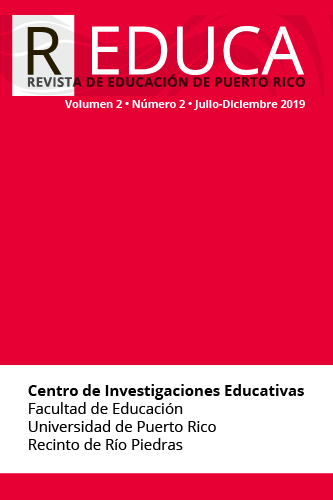Abstract
This qualitative research addresses the experiences of university students with occupational indecision in the light of two main aspects: their identity formation processes and their socio-economic reality. The approach to the concept of identity formation was based on the model of Marcia (1989) and the theory of vocational development of Donald Super. The strategy used was the phenomenological interview. Ten undergraduate students from the University of Puerto Rico, Río Piedras Campus, were interviewed among those that sought counseling in the Department of Student Development Counseling (DCODE, for its Spanish acronym) for the first time. It stands out that Marcia‘s identity formation model can be used as an intervention guide in the counseling process with participants. The model stages facilitate the development of an intervention plan through which clients can overcome their indecision and make an appropriate career selection. Following the findings, recommendations are offered for the development and improvement of occupational counseling services in the Department of Education, in higher education institutions in Puerto Rico and for the practice of occupational counseling.
References
Amorós, B. E. (2012). Influencia de las experiencias de vida jóvenes puertorriqueños en la selección de la carrera de medicina: Retos para la consejería ocupacional. (Disertación doctoral inédita). Universidad de Puerto Rico, Recinto de Río Piedras.
Blanco, B. A. (2009). El modelo cognitivo social del desarrollo de la carrera: Revisión de más de una década de investigación empírica. Revista de Educación, 350, 423-445. Disponible en http://www.educacionyfp.gob.es/revista-de-educacion/numeros-revista-educacion/numeros-anteriores/2009/re350/re350-18.html
Blustein, D. L., Devenis, L. E. & Kidney, B. A. (1989). Relationship between the identity formation process and career development. Journal of Counseling Psychology, 36(2), 196-202. Disponible en https://psycnet.apa.org/doi/10.1037/0022-0167.36.2.196
Creswell, J. W. (2013). Qualitative inquiry and research design: Choosing among five approaches (3ra. ed.). Thousand Oaks, CA: Sage.
Departamento del Trabajo y Recursos Humanos de Puerto Rico. (2015). Estadísticas de empleo por ocupación. Recuperado de http://www.mercadolaboral.pr.gov/Tablas_Estadisticas/Ocupaciones/T_Empleo_Salario_Ocupacion.aspx
Erikson, E. H. (1959). Identity and the life cycle. Psychological Issues, 1, 1-171.
Erikson, E. H. (1968). Identity: Youth and crisis. Nueva York, NY: Norton.
Gottfredson, L. S. (1981). Circunscripción y compromiso: Una teoría del desarrollo de las aspiraciones ocupacionales. Revista de Psicología y Consejería, 28(6), 545-579.
Gottfredson, L. S. (2000). Teoría de la génesis de las aspiraciones profesionales (M. Migliozzi, trad.) Buenos Aires, Argentina: Publicaciones de Facultad de Psicología, UBA.
Holland, J. L. (1997). Making vocational choices (3rd. ed.). Odessa, FL: Psychological Assessment Resources.
Holland, J. L., Gottfredson, G. D. & Power, P. G. (1980). Some diagnostic scales for research in decision making and personality: Identity, information and barriers. Journal of Personality and Social Psychology, 39(6), 1191-1200. Disponible en https://psycnet.apa.org/doi/10.1037/h0077731
Krumboltz, J. D. (2009). The happenstance theory. Journal of Career Assessment, 17(2), 135-154. Disponible en https://doi.org/10.1177%2F1069072708328861
Krumboltz, J. D. & Levin, A. S. (2010). Luck is no accident: Making the most of happenstance in your life and career. Atascadero, CA: Impact Publishers.
Lent, R. W., Brown, S. D. & Hackett, G. (1994). Toward a unifying social cognitive theory of career and academic interest, choice and performance. Journal of Vocational Behavior, 45(1), 79-122. Disponible en https://doi.org/10.1006/jvbe.1994.1027
Lucca Irizarry, N. & Berríos Rivera, R. (2003). Investigación cualitativa en educación y ciencias sociales. Hato Rey, P. R.: Publicaciones Puertorriqueñas.
Marcia, J. E. (1966). Development and validation of ego-identity status. Journal of Personality and Social Psychology, 3(5), 551-558. Disponible en https://psycnet.apa.org/doi/10.1037/h0023281
Marcia, J. E. (1980). Identity in adolescence. Handbook of Adolescent Psychology, 9(11), 159-187.
Marcia, J. E. (1989). Identity and intervention. Journal of Adolescence, 12(4), 401-410. Disponible en https://doi.org/10.1016/0140-1971(89)90063-8
Marcia, J. E., Waterman, A. S., Matteson, D. R., Archer, S. L. & Orlofsky, J. L. (1993). Ego identity: Handbook for psychosocial research. Nueva York, NY: Springer-Verlag.
Moustakas, C. E. (1994). Phenomenological research methods. Thousand Oaks, CA: Sage Publications.
Rovira, A. (1997). Crecimiento y desarrollo humano (3ra. ed.). República Dominicana: Editora Centenario.
Rubin, H. J. & Rubin, I. S. (2012). Qualitative interviewing: The art of hearing data (3ra. ed.). Thousand Oaks, CA: Sage.
Schwartz, S. (2007). The structure of identity consolidation: Multiple correlated constructs or one supraordinate construct? Identity: An International Journal of Theory and Research, 7(1), 27-49. Disponible en https://doi.org/10.1080/15283480701319583
Selingo, J. J. (2013a). College (un)bound: The future of the higher education and what it means for the students. Nueva York, NY: Houghton Mifflin Harcourt Publishing (arreglo especial con Amazon Publishing).
Selingo, J. J. (2013b). Does the college major matter? Not really. The New York Times. Recuperado de http://thechoice.blogs.nytimes.com/2013/04/29/does-the-college-major-matter-not-really/
Super, D. E. (1953). A theory of vocational development. American Psychologist, 8, 185-190. Disponible en https://psycnet.apa.org/doi/10.1037/h0056046
Super, D. E. (1988). Vocational adjustment: Implementing a self-concept, Career Development Quarterly, 36, 188-194. Disponible en https://doi.org/10.1002/j.2161-0045.1988.tb00509.x
U.S. Department of Labor. (2015). Occupational Outlook Handbook 2014-2015. Indianapolis, IN: JIST Works. Recuperado de http://www.bls.gov/ooh/a-z-index.htm
Vázquez, F., Torres, M. & Negrón, S. (2004). Estudio de los factores socioeconómicos que le impiden o le dificultan a los egresados de escuela superior realizar estudios en las instituciones de educación superior en Puerto Rico al inicio del siglo XXI. Recuperado de http://www.agencias.pr.gov/agencias/cepr/inicio/Investigacion/Documents/Publicaciones/Estudio%20Factores%20Socioeconomicos%20_%20Fundacion%20Comunitaria%20_%20Fernando%20Vazquez%20Calle.pdf
Vera Noriega, J. A. & Valenzuela Medina, J. E. (2012). El concepto de identidad como recurso para el estudio de transiciones. Psicología & Sociedades, 24(2), 272-282. Disponible en http://www.scielo.br/pdf/psoc/v24n2/03.pdf
Wolcott, H. F. (1994). Transforming qualitative data: Description, analysis, and interpretation. Thousand Oaks, CA: Sage.
The contents published in the Puerto Rico Journal of Education is freely distributed under open access practices, in accordance with the Creative Commons license, Attribution-NonCommercial 4.0 International (CC BY-NC 4.0). Through these principles, the journal and its authors allow readers to access, reproduce and share articles in full text. Users should give credit to authors in a reasonable way without suggesting they have their support. Under no circumstances, readers may make use of the contents for commercial purposes. The authors retain copyright on their works.

